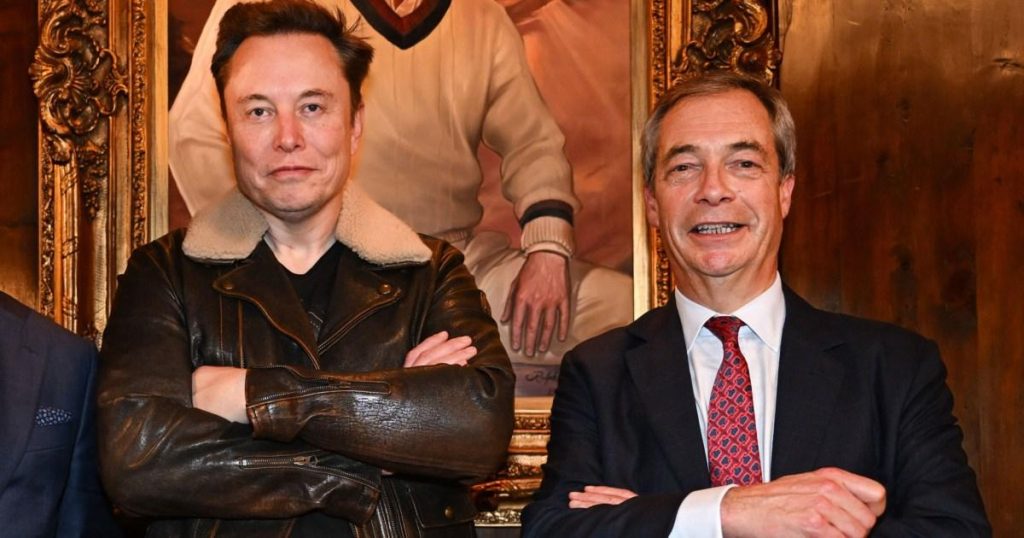Nigel Farage, leader of the Reform UK party, has staunchly defended Elon Musk, the owner of X (formerly Twitter), following Musk’s controversial statements regarding the UK government’s handling of grooming gangs. Musk’s pronouncements, which included accusations against prominent figures like Jess Phillips and Keir Starmer, sparked considerable backlash. However, Farage, who reportedly stands to receive a substantial £80 million investment from Musk for his political party, characterized Musk’s remarks as an exercise in free speech, a principle he prioritized even when finding the content “offensive.” Farage emphasized the importance of open dialogue and debate, suggesting that Musk’s ownership of X has created a platform conducive to such discussions, even if the views expressed are contentious.
Farage’s defense of Musk underscores a complex interplay between free speech absolutism, political expediency, and the influence of wealthy individuals in shaping public discourse. While Farage publicly championed Musk’s right to express his opinions, critics have raised concerns about the potential for misinformation and the amplification of harmful rhetoric on platforms like X. Musk’s assertions regarding the grooming gangs scandal, viewed by many as unsubstantiated and inflammatory, highlight the tension between promoting unfettered expression and mitigating the spread of potentially damaging narratives. The situation is further complicated by Farage’s apparent financial ties to Musk, raising questions about the extent to which his defense is motivated by genuine conviction versus political pragmatism.
The controversy surrounding Musk’s statements also draws attention to the evolving role of social media platforms in disseminating information and influencing political discourse. X, under Musk’s leadership, has positioned itself as a bastion of free speech, a stance that has attracted both praise and criticism. Supporters argue that the platform allows for open exchange of ideas and challenges conventional narratives, while detractors express concerns about the potential for unchecked misinformation and the amplification of extremist viewpoints. The incident involving Musk’s pronouncements on the grooming gangs scandal serves as a microcosm of this broader debate, highlighting the challenges of balancing free expression with the need to combat harmful content and ensure responsible online discourse.
Farage’s assertion that Musk’s support enhances his party’s image among young voters further complicates the issue. This suggests a calculated political strategy, leveraging Musk’s public persona and financial clout to attract a demographic that might otherwise be disengaged from traditional politics. This raises questions about the potential for wealthy individuals to exert undue influence on political processes, not only through direct financial contributions but also by shaping public perception and mobilizing specific demographics. The convergence of free speech absolutism, political opportunism, and the power of social media platforms creates a complex and potentially volatile dynamic in the contemporary political landscape.
The response to Musk’s statements and Farage’s subsequent defense has been divided. While some have echoed Farage’s sentiments about the importance of free speech, others have criticized Musk for spreading unsubstantiated claims and potentially harmful rhetoric. Health Secretary Wes Streeting, for instance, questioned the normalcy of a tech billionaire accusing the Prime Minister of complicity in serious crimes and challenged Farage’s willingness to associate with such an individual. This divergence of opinion reflects the broader societal debate regarding the limits of free speech and the responsibilities of individuals and platforms in preventing the spread of misinformation.
The incident involving Elon Musk’s statements and Nigel Farage’s defense underscores several key issues in the contemporary political and social landscape. These include the tension between free speech and responsible online discourse, the influence of wealthy individuals in shaping political narratives, and the evolving role of social media platforms in disseminating information and influencing public opinion. The controversy also highlights the challenges of navigating these complex issues in an increasingly polarized and interconnected world, where the lines between free expression, misinformation, and political opportunism can become blurred. The debate surrounding this incident serves as a reminder of the ongoing need for critical engagement with information, responsible online behavior, and a nuanced understanding of the interplay between free speech, political influence, and the power of social media platforms.




